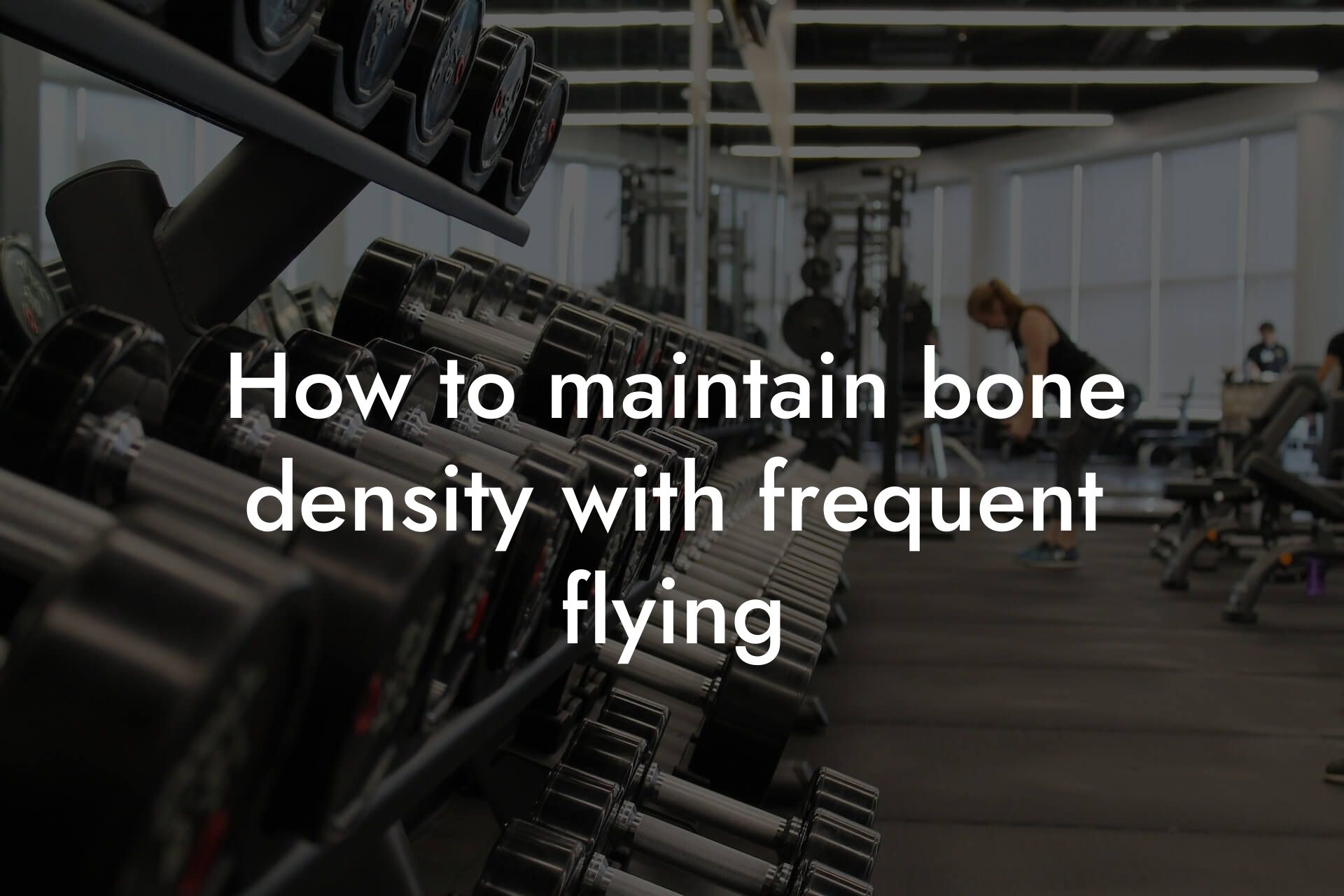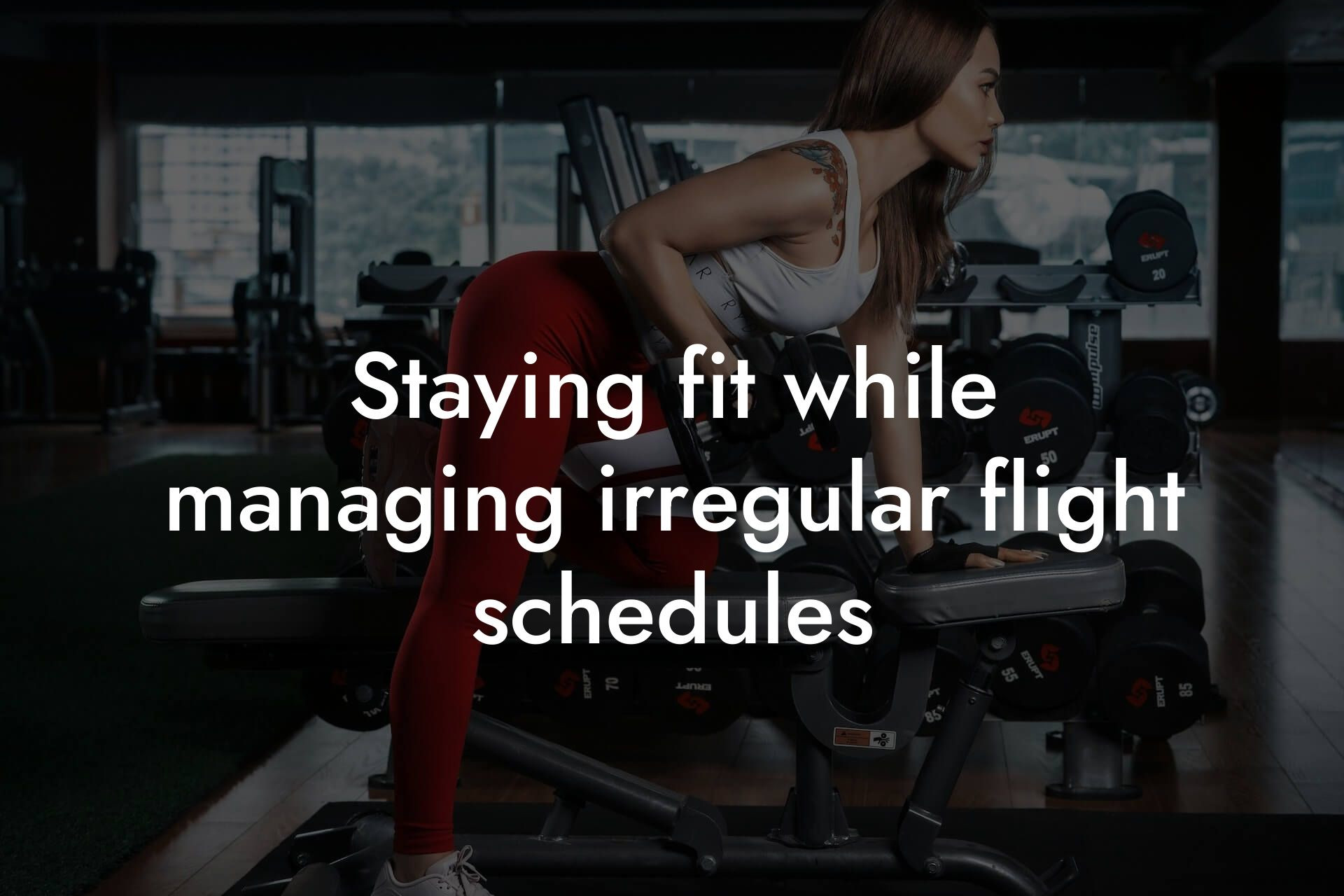As an aviation professional, you're no stranger to crossing time zones and dealing with the physical demands of flying. However, managing jet lag and maintaining your physical fitness can be a significant challenge. In this article, we'll provide you with expert advice and practical tips to help you overcome these obstacles and perform at your best.
Table of Contents
Understanding Jet Lag
Jet lag, also known as desynchronosis, occurs when your body's internal clock is disrupted due to rapid travel across time zones. This can lead to a range of symptoms, including fatigue, insomnia, digestive problems, and difficulty concentrating. The severity of jet lag depends on the number of time zones crossed, as well as individual factors such as sleep quality and physical activity.
The Impact of Jet Lag on Fitness
Jet lag can have a significant impact on your physical fitness, particularly if you're an aviation professional who relies on a high level of physical performance. When you're tired and disoriented, you're more likely to make mistakes, react slowly, and experience decreased coordination and balance. Additionally, jet lag can disrupt your normal exercise routine, leading to decreased cardiovascular fitness, strength, and flexibility.
Pre-Flight Preparation
Before you take to the skies, there are several steps you can take to prepare your body for the rigors of flying. First, make sure you're well-rested and hydrated. Aim for 7-9 hours of sleep the night before your flight, and drink plenty of water to stay hydrated. You should also avoid heavy meals and caffeine in the hours leading up to your flight, as these can exacerbate jet lag symptoms.
In-Flight Strategies
During the flight, there are several strategies you can use to minimize the effects of jet lag. First, try to stay active by stretching and moving around the cabin regularly. This can help reduce stiffness and improve circulation. You should also adjust your sleep schedule to your destination time zone as soon as possible. If you're flying east, try to sleep during the flight, while if you're flying west, stay awake and enjoy the in-flight entertainment.
Post-Flight Recovery
After you land, it's essential to prioritize recovery and allow your body to adjust to the new time zone. Try to get some natural light exposure, as this can help regulate your circadian rhythms. You should also stay hydrated by drinking plenty of water, and avoid heavy meals and caffeine. Finally, try to get some rest as soon as possible, aiming for 7-9 hours of sleep to help your body recover from the flight.
Fitness Tips for Aviation Professionals
As an aviation professional, it's essential to prioritize your physical fitness to perform at your best. Here are some tips to help you stay fit and healthy on the go:
-
Stay active: Aim for at least 30 minutes of moderate-intensity exercise per day, such as brisk walking, cycling, or swimming.
-
Incorporate strength training: Use resistance bands or lightweight dumbbells to maintain strength and muscle mass.
-
Focus on flexibility: Incorporate stretching exercises into your daily routine to improve flexibility and reduce the risk of injury.
-
Get enough sleep: Aim for 7-9 hours of sleep per night to help your body recover from the physical demands of flying.
-
Monitor your nutrition: Focus on whole, nutrient-dense foods such as fruits, vegetables, whole grains, and lean proteins.
Using DEXA Scanning to Monitor Your Fitness
At Tano Performance Group, we understand the importance of tracking your physical fitness and body composition. That's why we recommend using DEXA scanning to monitor your progress. DEXA scanning provides a comprehensive assessment of your body composition, including bone density, muscle mass, and body fat percentage. This information can help you identify areas for improvement and track the effectiveness of your fitness routine.
Managing jet lag and fitness as an aviation professional requires careful planning, preparation, and attention to detail. By following the tips and strategies outlined in this article, you can minimize the effects of jet lag and maintain your physical fitness, even in the face of demanding flight schedules. Remember to prioritize your health and wellness, and don't hesitate to seek professional guidance if you need additional support. With the right tools and knowledge, you can perform at your best and achieve your goals as an aviation professional.
Frequently Asked Questions
What is jet lag, and how does it affect aviation professionals?
Jet lag, also known as desynchronosis, is a temporary disorder that occurs when our internal body clock is disrupted due to traveling across different time zones. Aviation professionals, who frequently cross multiple time zones, are more prone to experiencing jet lag. This can lead to fatigue, insomnia, digestive issues, and decreased performance, making it challenging to maintain their physical fitness and overall well-being.
How does jet lag impact physical performance?
Jet lag can significantly affect physical performance by disrupting the body's natural rhythms, leading to decreased strength, endurance, and reaction time. It can also cause gastrointestinal issues, which can lead to dehydration and electrolyte imbalances, further compromising physical performance.
What are the common symptoms of jet lag?
The common symptoms of jet lag include fatigue, insomnia, daytime sleepiness, difficulty concentrating, headaches, digestive issues, and mood disturbances. These symptoms can vary in severity and duration, depending on the individual and the number of time zones crossed.
How can aviation professionals minimize the effects of jet lag?
To minimize the effects of jet lag, aviation professionals can adopt strategies such as adjusting their sleep schedule before traveling, staying hydrated, avoiding heavy meals, and getting some morning sunlight exposure after arrival. They can also consider using melatonin supplements, but only under the guidance of a healthcare professional.
What is the importance of sleep in managing jet lag?
Sleep plays a crucial role in managing jet lag. Aim to get at least 7-8 hours of sleep each night, and establish a consistent sleep schedule to help your body adjust to the new time zone. Avoid napping during the day, and create a sleep-conducive environment to improve the quality of your sleep.
How can aviation professionals maintain their fitness routine while traveling?
To maintain their fitness routine while traveling, aviation professionals can pack exercise gear, such as resistance bands or a yoga mat, and find hotel gyms or local fitness studios. They can also opt for bodyweight exercises or high-intensity interval training (HIIT) that can be done in a small space. Additionally, they can use fitness apps or online platforms to stay motivated and accountable.
What are some healthy snack options for aviation professionals on-the-go?
Healthy snack options for aviation professionals on-the-go include nuts, seeds, dried fruits, energy bars, and jerky. They can also consider packing their own snacks, such as carrot sticks with hummus, trail mix, or energy balls made with oats and nuts.
How can aviation professionals stay hydrated during long flights?
To stay hydrated during long flights, aviation professionals can drink plenty of water, avoid caffeine and alcohol, and opt for herbal teas or coconut water instead. They can also consider bringing their own refillable water bottle and avoiding sugary drinks.
What are some tips for managing meal times while traveling across different time zones?
To manage meal times while traveling across different time zones, aviation professionals can eat small, frequent meals, avoid heavy meals close to bedtime, and opt for meals that are high in protein and complex carbohydrates. They can also consider packing their own meals or snacks to ensure they have healthy options available.
How can aviation professionals reduce stress while traveling?
To reduce stress while traveling, aviation professionals can practice relaxation techniques such as deep breathing, meditation, or yoga. They can also listen to calming music, read a book, or take a warm bath to unwind. Additionally, they can prioritize self-care activities, such as getting a massage or taking a power nap.
What is the importance of stretching and foam rolling for aviation professionals?
Stretching and foam rolling are essential for aviation professionals to maintain flexibility, reduce muscle tension, and improve circulation. Regular stretching can also help reduce the risk of injury and improve overall physical performance.
How can aviation professionals incorporate strength training into their fitness routine while traveling?
To incorporate strength training into their fitness routine while traveling, aviation professionals can use resistance bands, do bodyweight exercises, or find hotel gyms with free weights or machines. They can also consider using fitness apps or online platforms that provide strength training workouts.
What are some tips for maintaining bone density for aviation professionals?
To maintain bone density, aviation professionals can engage in weight-bearing exercises, such as running or jumping, and incorporate strength training exercises that target the muscles surrounding the bones. They can also ensure adequate calcium and vitamin D intake through their diet or supplements.
How can aviation professionals monitor their body fat percentage while traveling?
To monitor their body fat percentage while traveling, aviation professionals can use a body fat caliper, track their weight and measurements, or take progress photos. They can also consider using mobile apps or online platforms that provide body fat tracking features.
What are some healthy habits that aviation professionals can adopt to improve their overall well-being?
Healthy habits that aviation professionals can adopt to improve their overall well-being include regular exercise, healthy eating, adequate sleep, stress management, and staying hydrated. They can also prioritize self-care activities, such as meditation, reading, or spending time with loved ones.
How can aviation professionals stay motivated to maintain their fitness routine while traveling?
To stay motivated to maintain their fitness routine while traveling, aviation professionals can set realistic goals, find a workout buddy, and track their progress. They can also reward themselves for reaching their fitness milestones and celebrate their successes.
What are some common mistakes that aviation professionals make when trying to manage jet lag and fitness?
Common mistakes that aviation professionals make when trying to manage jet lag and fitness include not adjusting their sleep schedule, not staying hydrated, and not prioritizing self-care. They may also underestimate the impact of jet lag on their physical performance and overall well-being.
How can aviation professionals prioritize their physical and mental health while traveling?
To prioritize their physical and mental health while traveling, aviation professionals can make healthy choices, such as exercising regularly, eating nutritious food, and getting enough sleep. They can also prioritize self-care activities, such as meditation, reading, or spending time with loved ones.
What are some resources available to aviation professionals to help them manage jet lag and fitness?
Resources available to aviation professionals to help them manage jet lag and fitness include fitness apps, online platforms, and health and wellness websites. They can also consult with healthcare professionals, registered dietitians, or certified personal trainers for personalized guidance.
How can aviation professionals make their fitness routine more enjoyable and sustainable?
To make their fitness routine more enjoyable and sustainable, aviation professionals can find activities they enjoy, such as running, swimming, or dancing, and incorporate them into their routine. They can also vary their workout routine, try new exercises, and find a workout buddy to stay motivated.
What are some long-term benefits of managing jet lag and fitness for aviation professionals?
The long-term benefits of managing jet lag and fitness for aviation professionals include improved physical performance, enhanced overall well-being, and reduced risk of chronic diseases. They can also experience improved mental health, increased energy levels, and better sleep quality.
Here are some related articles you might love...
- How to maintain bone density with frequent flying
- The benefits of DEXA scans for aviation professionals
- Staying fit while managing irregular flight schedules
- Balancing in-flight duties with personal fitness goals
- Nutrition strategies for staying healthy on long flights
- Managing stress and staying fit in the aviation industry
- The impact of physical health on flight safety
- The role of physical fitness in maintaining flight readiness
- Quick workouts for pilots and flight attendants during layovers
Zak Faulkner
Zak Faulkner is a leading authority in the realm of physical health and body composition analysis, with over 15 years of experience helping professionals optimise their fitness and well-being. As one the experts behind Tano Performance Group, Zak has dedicated his career to providing in-depth, science-backed insights that empower clients to elevate their physical performance and overall health.
With extensive knowledge of DEXA technology, Zak specializes in delivering comprehensive body assessments that offer precise data on body fat, muscle mass, bone density, and overall physique. His expertise enables individuals to make informed decisions and achieve their fitness goals with accuracy and confidence. Zak’s approach is rooted in a deep understanding of human physiology, combined with a passion for helping clients unlock their full potential through personalised strategies.
Over the years, Zak has earned a reputation for his commitment to excellence, precision, and client-focused service. His guidance is trusted by top professionals who demand the best when it comes to their health. Whether advising on fitness programs, nutritional strategies, or long-term wellness plans, Zak Faulkner’s insights are a valuable resource for anyone serious about taking their health and fitness to the next level.
At Tano Performance Group, Zak continues to lead our Content Team revolutionising how professionals approach their physical health, offering unparalleled expertise that drives real results.




